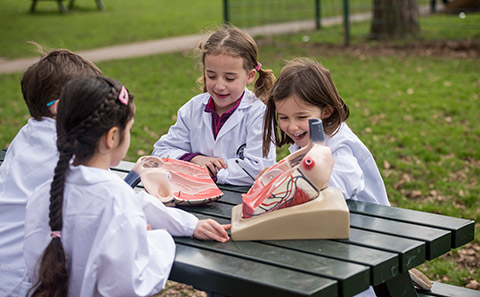
LifeLab at the University of Southampton has been awarded £200,000 by Southampton City Council to fund key work to tackle obesity among primary school children in the city over the next three years.
In partnership with University Hospital Southampton NHS Foundation Trust, the University of Southampton Early LifeLab programme aims to support behaviour change in children using a series of 'teaching toolkits'. These make the science behind the need for healthy diet, physical activity and sleep accessible to children, helping them to discover why this matters for themselves, supporting children and their families in making healthy choices.
Professor Keith Godfrey, one of the LifeLab programme directors and a lead researcher in the NIHR Southampton Biomedical Research Centre, commented: "Childhood obesity in the UK is a major public health problem. In 2019/2020, nearly one in four children in the first year of primary school were overweight or obese. Over the course of the pandemic, levels of overweight and obesity in children have seen a sharp worsening, highlighting the need for new approaches."
Dr Kath Woods-Townsend is the programme lead for Early LifeLab: "Tackling obesity in children was already on our agenda at LifeLab pre COVID, but the pandemic and its effects have brought the issue even more to the fore.
"Based on our well established and successful LifeLab programme for secondary school students, Early LifeLab has 4 modules across the primary phase (Early Years, Keystage 1, Lower Keystage 2 and Upper Keystage 2) that are delivered directly in schools. We know this is an effective setting to reach a large population of children across all communities, and we provide the tools teachers need to deliver health messages in an engaging way."
All primary phase settings in Southampton can opt to take part in Early LifeLab. Participating schools will receive a fully-resourced "flight case", which contains all the equipment, resources and teaching information needed to deliver the lessons.
Debbie Chase, Director of Public Health at Southampton City Council said: "The opportunity for children in the city to have access to the LifeLab resources is very much in line with our work in early health prevention and education messages. Programmes like this from LifeLab are essential in helping our community recover from the pandemic and build positives outcomes for the future."
This is an important collaboration between Public Health at Southampton City Council, NIHR Southampton Biomedical Research Centre, the University Hospital Southampton and the University, in particular the Widening Participation and Social Mobility team who are contributing direct funding in addition to the Council.
Kirsten Wythe, Head of Access in the Widening Participation and Social Mobility team said, "This project very much complements the work we do with younger children and families, which is why we were keen to be involved. We are delighted to have been able to provide funding to support the development of the resources, and the work to transform the LifeLab COVID-19 Warriors into Health Warriors with video content to reinforce the messages. We are looking forward to being part of the project as it grows."
At the height of the pandemic LifeLab developed and implemented the successful COVID-19 Warriors programme with funding from the Department of Health and Social Care.
In collaboration with primary school students, LifeLab created a team of 'COVID-19 Health Warriors' and produced a series of short educational videos and created a community that children, on completion of the programme, could join. The project was endorsed by the Royal Society for Public Health, who promoted it on their YouTube channel.
The initiative follows on from the University of Southampton commitment to help and support communities in Southampton and the surrounding region. Professor Mark E. Smith, President and Vice-Chancellor said: "We are delighted to be leading this collaborative activity to overcome the challenges facing young children in local communities across Southampton. The University's research, education, alumni and outlook are global, but we are rooted in our community and committed to forming closer links with local people and organisations."
Professor Jane Falkingham, Vice-President International & Engagement of the University of Southampton, added: "The University of Southampton has played important local and national roles in supporting communities through the pandemic. Working with young people to support the city's recovery from the pandemic will be critical in helping local communities thrive and we are delighted to be working with Southampton City Council on this important initiative."
The Council grant for Early LifeLab will run until 2025.






